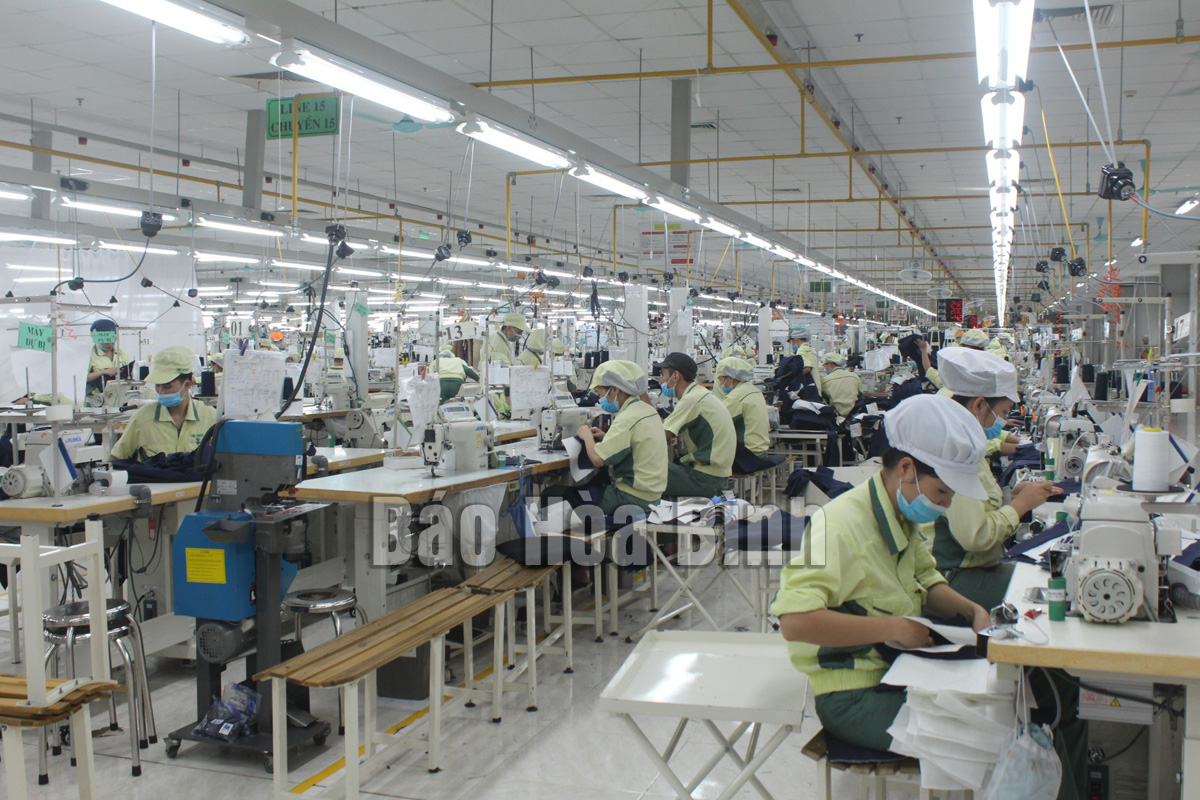
(HBO) – Not only located next to Hanoi capital city and acting as a gateway to the northwestern region, Hoa Binh province also boasts huge potential for developing tourism, agriculture, and industry amid a quick shift in the investment flow from other localities. Therefore, it now holds considerable opportunities to welcome a new wave of investment and become a development centre in the region.

Luong Son district is currently home to 48 investment
projects in its industrial parks, which has created momentum for local
socio-economic development. The photo is taken at the Midori Apparel Vietnam
Hoa Binh Co. Ltd in Luong Son Industrial Park.
Investment poured into the province has been on
the rise in recent years. A large number of domestic and foreign investors,
including major ones, have chosen Hoa Binh as their destination.
Data from the provincial People’s Committee show
that Hoa Binh accommodated 629 valid investment projects funded with non-State
budget capital as of mid-June 2021. They include 40 FDI projects worth over
619.36 million USD and 589 domestic ones worth almost 92.22 trillion VND (4
billion USD).
To attract investment and support major projects
to soon become operational, the provincial Party Committee and People’s
Committee have organised many meetings and dialogues with enterprises and
investors to learn about their situation and direct relevant departments and
localities to tackle obstacles facing their operations.
The administration of Hoa Binh also issued a set
of criteria for selecting investors in projects that use land. These criteria
prioritise investors with sufficient financial strength, experience, and fast
project implementation.
Aside from rolling out the "red carpet” for
investors, the provincial People’s Committee has also ordered thorough
settlement of projects lagging behind schedule, using land ineffectively, or
violating other legal regulations on investment and land.
Competent agencies have considered support for
the projects that failed to meet schedule due to objective reasons such as site
clearance problems and impacts by the COVID-19 pandemic. They were asked to
only consider and approve the project adjustments proposed by investors who
have realised their commitments and met all the regulated standards./.
According to data from the Hoa Binh Provincial Party Committee, the industrial production index for the first six months of 2025 is estimated to have increased by 20% compared to the same period last year. This marks the highest year-on-year growth rate for this period since 2020.
In the first six months of 2025, Hoa Binh province’s export turnover was estimated at 1.145 billion USD, marking an 18.11% increase compared to the same period in 2024. Import turnover was estimated at $ 804 million, a 17.15% increase, which helped the province maintain a positive trade balance.
The lives of the ethnic minority farmers in Tan Lac district have gradually improved thanks to the new directions in agricultural production. This is a testament to the collective strength fostered through the professional associations and groups implemented by various levels of the district’s Farmers’ Union.
With the motto the "product quality comes first,” after nearly one year of establishment and operation, Muong village’s Clean Food Agricultural and Commercial Cooperative, located in Cau Hamlet, Hung Son Commune (Kim Boi district), has launched reputable, high-quality agricultural products to the market that are well-received by consumers. The products such as Muong village’s pork sausage, salt-cured chicken, and salt-cured pork hocks have gradually carved out a place in the market and they are on the path to obtaining the OCOP certification.
In the past, the phrase "bumper harvest, rock-bottom prices" was a familiar refrain for Vietnamese farmers engaged in fragmented, small-scale agriculture. But today, a new spirit is emerging across rural areas of Hoa Binh province - one of collaboration, organisation, and collective economic models that provide a stable foundation for production.
Maintaining growing area codes and packing facility codes in accordance with regulations is a mandatory requirement for agricultural products to be eligible for export. Recently, the Department of Agriculture and Environment of Hoa Binh province has intensified technical supervision of designated farming areas and packing facilities to safeguard the "green passport" that enables its products to access international markets.



